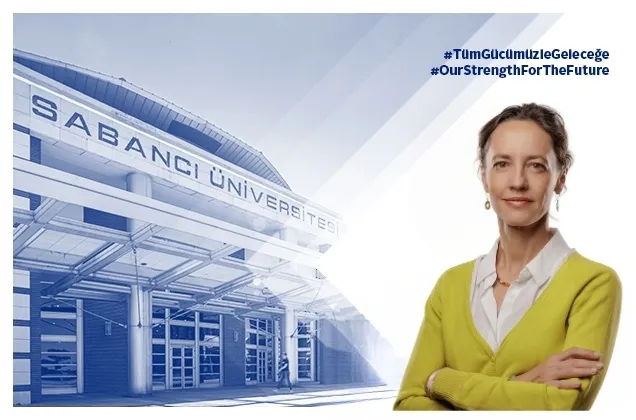20/06/2019
Yusuf Leblebici: "You need to have a motive to do great things, and that motive is passion"
Sabancı University’s President Yusuf Leblebici will be our guest for this edition of “Wednesday Talks with Nesrin Balkan". We spoke with him on his observations regarding university life in Turkey compared to the life in Switzerland and the US, where he spent most of his career. We also discussed what it means to be a "Professor", what the responsibilities of a faculty member are, and how he teaches a course. Other talking points include his plans for the future of Sabancı University, his outlook on life, his ideal holiday, and his conception of happiness. I wish you a pleasant read.
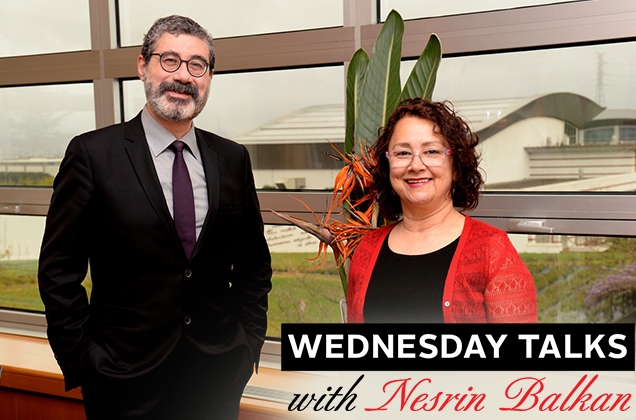
Welcome to Wednesday Talks. You were at Sabancı University from 1999 to 2002, when you became Chair Professor and Director of the Microelectric Systems Laboratory at the Swiss Federal Institute of Technology in Lausanne (EPFL), How does university life in Switzerland compare to that in Turkey?
I was in Switzerland for a long time, nearly 18 years. Prior to that, I worked in the United States for more than a decade. Comparing the Turkish experience to the experience in abroad brings up a number of great differences punctuated by similarities.
To begin with: I graduated from the Istanbul High School for Boys, a germanophone school, so my first experience abroad was in Germany. I went to the University of Aachen after high school, where I experienced university for the first time. The university was a familiar environment to me since both my parents were members of faculty at Istanbul Technical University, and I had an idea about what went on at a university since I was a child. But my first actual experience was in 1980. This was an interesting experience because, as you know, university is a life-changing experience. I was only able to compare it to the Turkish environment after I returned to Istanbul Technical University in 1982. As a student, I had noticed that there was a world of difference between my experience in Germany and Turkey. I stayed at Istanbul Technical University until the end of my graduate degree. In 1986, I went abroad again for my PhD, this time to the United States. This was a far longer and extensive experience as I completed my PhD and worked there for a while. Later, I went back to the US for work.
"University is a life-changing experience"
Let me begin by comparing the academic environment in Turkey to that in the US. Before Sabancı University, my only university experience in Turkey was as a student and then an associate professor at Istanbul Technical University. When you compare a public university in Turkey to an American university, you notice a great difference in the speed at which things are done. What I saw and experienced at the University of Illinois in terms of implementing and concluding research projects, publishing results, and receiving answers from people were truly eye-opening experiences.
In addition, you get to work with people from literally all over the world, especially in the US, which was also a great first experience for me. It also taught me how I could work with people from other countries and cultures, and how I could cooperate with them in the most efficient manner. This was something I would not have been able to do in Turkey.
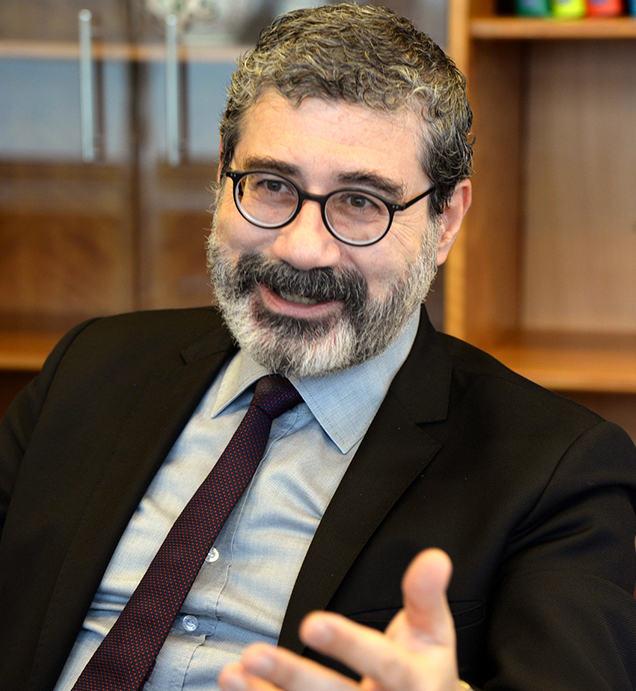
After taking part in the establishment of Sabancı University, I went to Switzerland in early 2002 and stayed there for a long time. This brings us to the second part of your question. It is very difficult to compare Switzerland to Turkey as there is a great difference in size between the two countries. The population of Switzerland is 8 million, almost half of Istanbul's population. The city where I lived, Lausanne, has 300,000 residents.
It is more like a small town.
Exactly. But the university is a great environment where intense and active work takes place. Interestingly, the first thing I found out about Switzerland was how much bureaucracy they had. This was a contrast to my US experience. The real learning moment was when I discovered how bureaucracy and efficiency could coexist. In Turkey, we always complain about bureaucracy and how it cripples our efficiency, and we have a point. Switzerland, on the other hand, thrives on bureaucracy; it is incomparable to the US. But seeing that one could have effective results even in a bureaucratic environment was my key takeaway.
This experience must have been valuable for adapting to Turkey.
I certainly hope so.
I am confident. Why did you choose to go to Switzerland instead of, say, the US or Canada?
Like I said, I had already lived and worked in the US for a long time and I had a fairly good idea of the working environment there. I wanted to be a little closer to Turkey; in fact, what drew me to Switzerland was its proximity. I had already played a part in the establishment of Sabancı University from 1999 to 2001. When I decided to go to Switzerland in early 2002, I was aware that good things were going on in Turkey and I did not want to stray too far, perhaps instinctively. So, at that point in my career, I decided to remain within Europe instead of changing continents.
I also had previous connections in Switzerland, so I was aware of the environment there. It was a place that I knew; I had an idea about what they were doing. I felt that I could be happy in that environment, so I chose to go to Switzerland.
What were the factors in your returning to Turkey after 17 years in Switzerland, and why did you choose Sabancı University?
This is a very easy question: Sabancı University was my first. But more importantly, I can see there is much to do here and I want to do things as long as I have the energy for it, and that is mainly why I returned.
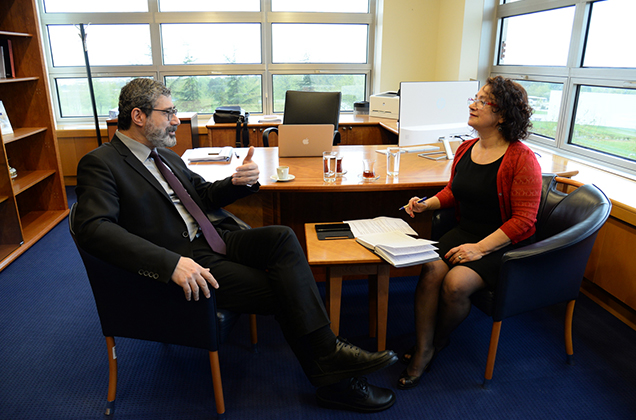
Yusuf Leblebici, Nesrin Balkan
"I chose to come to Sabancı University as this place keeps the spark of excitement alive"
When you spend a lot of time in a known environment, you settle into an efficient system, which is satisfactory but may berepetitive after a while. You have students, you have projects, you have a well-oiled machine that keeps turning year after year, but it grows into a cycle. Instead of that, I chose to come to Sabancı University as this place keeps the spark of excitement alive and has things to be done.
You have been the President of Sabancı University for 6 months...
Actually less than that.
What were your impressions of Sabancı University after 17 years? What did you learn that you did not already know?
I already had a great impression of Sabancı University that went back a long time. During my time in Switzerland, I worked with many Sabancı University graduates, so I was closely involved in the university's student profile. In fact, I was the PhD advisor of 7 or 8 Sabancı University graduates while there. I have had 45 PhD students so far, and 8 of them were Sabancı University graduates. That gave me full working knowledge of the university. But if we were to discuss what I learned since I took office here, one thing stands out: The institution I joined was much more mature compared to the one I left behind in 2002. It is now able to stand on its feet and make its presence known around the world, has evolved into a fully-developed institution, which makes me happy. It has overcome its growing pains and is fully prepared to grow and thrive. So my most important discovery about Sabancı University since I took office was realizing how mature it had become as an institution, which makes one proud.
It was taking its baby steps when you left...
Yes, it was a toddler.
And now it is a teenager that outgrows everything.
I would say more like a young adult, it is clearly getting there.
“Sabancı University is already one of Turkey's best universities; it is even the best in many aspects”
What do you plan to do at Sabancı University? What are your plans and thoughts for the near future?
As I said, seeing that great things could be done here was a major factor. One thing is key: We must not settle with being Turkey's best university, and need to start turning Sabancı into a global university. Sabancı University is already one of Turkey's best universities; it is even the best in many aspects. Of course we want to maintain this position, but going forward, we need to become a university that is recognized and respected worldwide. How will we go about doing that? To begin with, we want to bring the best of Turkish and foreign faculty members together in order to elevate our student quality even above what we currently have. This means increasing our visibility. We have excellent visibility in Turkey, but we need to improve upon what we already have abroad. This will be key to achieving our intended purpose. It is not easy to do; it will not happen in a couple of years; we need longer time. What we can do in the short term is to lay a foundation and get a starter culture. Since the institution is already at a certain level of maturity, I think we can keep walking towards success.
Being president is extremely time-consuming. Will you have the chance to teach courses?
I definitely want to; it is one of my favorite things. I enjoy teaching courses very much, and I even use chalk and blackboard to teach most of themç In fact, room G035 on the ground floor of the Faculty of Engineering and Natural Sciences still has a blackboard, or rather, a green board, and no other room in that hall has that conventional board. I had asked for that board from the late Tosun Hoca. New classrooms never have that; all they have is a whiteboard, which I never liked. I still have a soft spot for chalk. I had requested that at least one classroom should have the classic blackboard. The one in G035 is his heirloom. Of course, in all his magnanimity, Tosun Hoca did not refuse, and had a blackboard installed there. So I taught most of my courses there, and I even insisted on using chalk and blackboard for the majority of my courses in Switzerland.
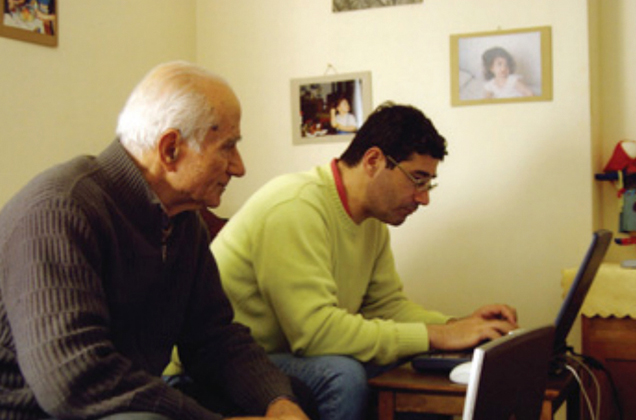
"All faculty members have one mission: To educate students"
Great.
I am extremely busy now, so I cannot even imagine teaching courses, but that does not mean I never will. Once things are a bit more settled, I would love to start teaching.
I am sure the students would love it too.
There is one thing I would like to say: Faculty members may have a tendency to become too involved in research and push teaching courses to the background. This should not at all be the case. No matter how intense their research may be, faculty must always make time to disseminate their knowledge by teaching students. There are two aspects to teaching. One: it is your mission. All faculty members have one mission: To educate students. Furthermore, teaching improves faculty members as well. You learn as you teach others so you can improve your knowledge.
It is an exchange of knowledge, a process of mutual learning.
Indeed. Teaching courses is a process of self-learning for the teacher. That is why I believe it should be as much a priority as doing research.
Based on what you say, the main activities of a faculty member are research and education. Are there any others?
There is also what we call "service."
Can you elaborate?
Serving the institution. We provide services to the institution we work in. This may involve taking part in various boards and councils.
Research and teaching take up roughly half of a faculty member's time. For some, research is dominant; for others, teaching. But both must be present to a certain degree. There is also a third aspect of work, which is service to your institution. All faculty members must contribute to the university in some ways. For instance, if a brainstorming session is in order for a syllabus review, you must be a part of it. If a new course is to be taught to students, if a new subject is being offered, how will bethat matter ? Or let's say that a link is to be established with a university abroad. What will be the best way to do this? Faculty members must provide input into these processes. That is what we call university services.There may be many different examples of this, these may be international relations, because we all have international connections. We all have accumulated experience and we must put that experience to the service of the institution in a way. If something has to be done, we must put our minds together and develop an idea, make a contribution to the best of our ability. This is what serving the institution is about; it is making your knowledge and experience available to the institution.
That is why Sabancı University's motto is "Creating and developing together".
Of course. This is not a set recipe where you get to study this and that, and then do some research, teach some courses and go home. It is not over. Faculty members must provide input into other matters that will help the development of the university. You cannot have a few administrators to make decisions for everything and communicate their orders to the faculty; every member of the community must play a part in this endeavor.
What scientific endeavors are you pursuing? Of course, I am not sure if they would fit in a nutshell.
Oh, you wish. Let me try to summarize. My area is microelectronics, or "chip design" in general terms. I have worked on designing the processors used by a wide variety of devices from smartphones to personal computers. It has a vast number of sub-fields that require expertise in their own right, so it is not a monolithic area of research. But I was lucky: Throughout my 35-year career, I was able to do research in many different sub-fields of microelectronics. I had the luxury of not being stuck in a particular field. One can also be productive under those circumstances, but I had the chance to work in many different areas. I was able to view problems from different angles and gain diverse experience. Which meant that I was able to train my students from a wider perspective.
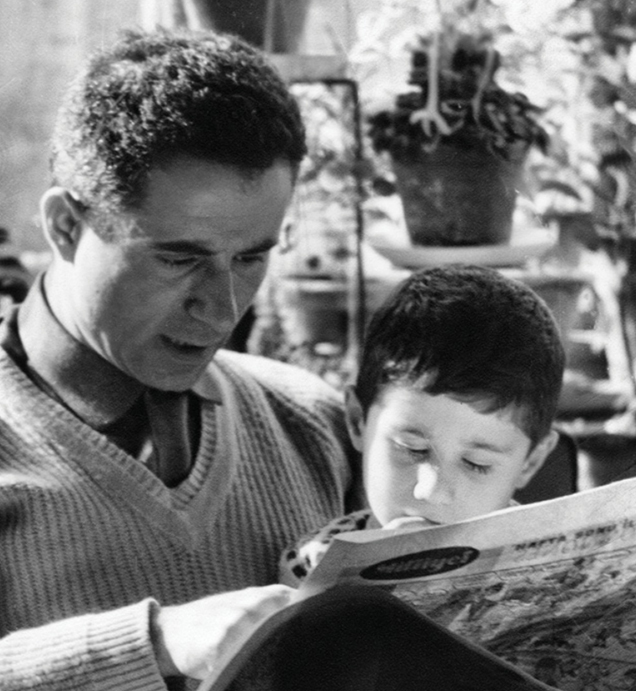
How did you choose your job, who were effective in making this choice? Did you always wanted this job, or did you change your mind somewhere down the line?
The fact that both my parents were professors of electronics must have played a part in this. I had been involved in electronics since I was a child. By the end of high school, when I was choosing a university program, I was not firmly decided: I toyed with the idea of going into medicine, biochemistry or genetics for a long time. In fact, I was not fully sure up until the last moment when I made my choice. I took the last university admission exam that was single-stage. The year after 1980, the two-stage system was introduced.
Did you take the exam in 1980?
Yes, June 1980. Back then, you had to make your choices before you took the exam; you would make your choices, have a list, and then sit the exam. My mind was not clear until the last moment, but I ended up writing Istanbul Technical University's electronics department at the top of the list, and never had any regrets.
It must feel great to have full confidence in the profession you chose.
Definitely.
Did you have a role model?
Many. The first was my father, of course. I also had a number of other role models, people older than I, whom I worked with for years. I learned a lot from the people I worked with during my master's and PhD, especially during my years in the US. This is not limited to work discipline or the approach to certain subject; I had excellent role models and influences regarding human relations, student relations, teaching techniques, choosing a subject to teach or do research in, and achieving results, all of whom played a vital role in my upbringing.
Really, how does one teach courses? Most academics I know are excellent talkers. They have to be, because they teach courses. They talk and appeal to young students, and must keep their attention fresh. I am sure everyone has a different style, but some are as engaging as stage performers. To keep students interested, no doubt.
That is definitely a requirement.
What is your teaching style?
You need to show some spirit. You should have classroom presence. You need to work that spirit into your teaching style. No student enjoys a professor who drones on and on; you need to build some excitement into the most mundane subject if you want your students to keep up.
There is one more thing to my teaching style: Every time I teach a subject, I do it a little differently. There are some courses that I have been teaching for 15 or 20 years, but if you were to record each of my classes, you would see that no two are the same: I always make some variations, and I may start and end at different points. The subject may be the same, but the delivery has differences built into it. A student who takes my course only once will not notice this, but it keeps my mind alert.
One also needs to consider that.
If I were to follow a script for each and every class I taught, I would be bored very quickly as well. By varying the way I deliver a subject, I keep my attention alive as well, and I can actually put my mind into the subject. There are times when I will not know how I will teach a subject before I start the class; it all comes out on its own.
“I have been all over the world: in Turkey, Europe, Switzerland, various states in the US; but I was always involved in a university.”
What does the university mean to you?
The university is my true passion. I have always been associated with universities one way or another. I have been all over the world: in Turkey, Europe, Switzerland, various states in the US; but I was always involved in a university. I was never employed in the corporate environment, for example. I know how it feels like, and I could probably have succeeded if I wanted to, but I did not want that kind of work. This has to do with my passion with university environment.
As if I knew, I had prepared a question about this: Are you passionate about something other than your job?
Let me put it this way: I used to have another passion, but I cannot find time for it anymore. I love the sea, and I have enjoyed swimming and diving since I was a teenager. I used to do a lot of diving when I was young, but I no longer have the time. I wish I could go back to it.
Maybe you will, later on.
I hope so.
What do you do other than work?
I like reading in my free time. This sounds cliche but it is not; I am particularly interested in history. I would rather read a historical book, learn about that time in history, draw lessons and view the present day through the lens of those lessons than read a novel. This could be from any historical period: the Middle Ages, ancient Greece, prehistoric times... But I think people should really know about history. I strongly recommend this to young people who are learning natural sciences or engineering. Peeking out of that world into a different realm has innumerable benefits, and history is just one example.
It nurtures one's mind.
Most definitely.
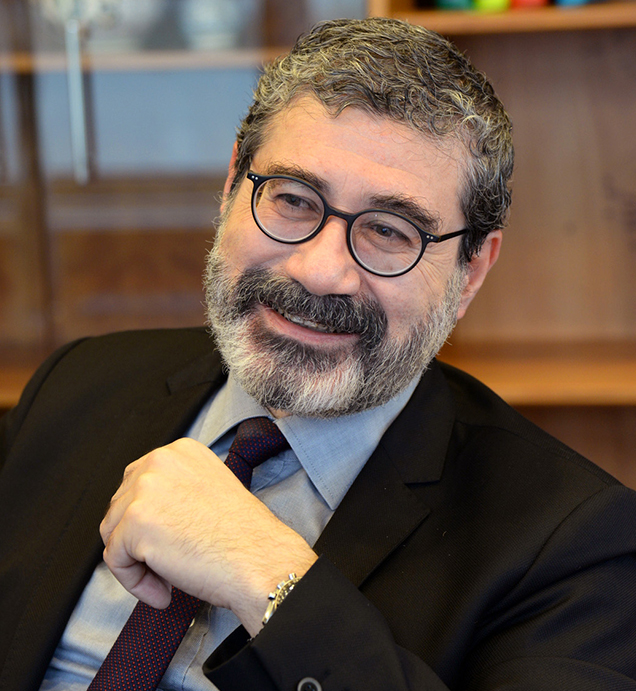
Yusuf Leblebici
What makes you laugh the most?
Well, I am quite quick to laugh. I think people should not take themselves too seriously. Especially in official environments, the higher a person climbs in hierarchy, the more glum they become, and they all but forget about laughing. I am not like that; I like a good laugh whatever the setting may be. I never thought about what makes me laugh because anything may, and I do not hesitate to laugh if something strikes me as funny. This may raise eyebrows in certain environments though, especially in a country like Turkey. You are not supposed to laugh even if you find something funny; that is one thing that I have been learning recently.
I think you could lead the way in this. Laughter is a great thing and everyone should be able to laugh without having reservations. And I agree with you that everyone is too glum.
I am sorry to see people who take themselves too seriously.
There is a misconception about being serious, as if one cannot be serious and smile at the same time.
Indeed.
What do you do to relax and have fun? What do you do on holidays, or do you even have holidays?
I think I hinted at it before: I am unable to take too much of a holiday, my work never seems to end. Some people manage to stay away from their emails for a week or ten days. They can simply switch off and not worry about any work-related issues for a week or two per year. I envy those who can, because I cannot. Even if I am on holiday in theory, I feel compelled to spend at least a few hours a day on work matters, because something always comes up that requires your attention. I cannot live with putting those matters off for a week. And this has always been the case with me, even before I started my career in Switzerland. I am always connected one way or another, but that does not mean I don’t have a rest. I relax and take it easy, I read, I try to be close to the sea if possible, but getting away from it all and having a week or two only to myself is not something that I am able to do.
I understand. So I think the sea has to be a part of any holiday that you take.
I would rather be close to the sea. I have always been close to it since I was a child. When I was a student at the Istanbul High School for Boys, I used to take the ferry to Karaköy every day and cross the Galata Bridge to walk to Cağaloğlu, where the school was. I have always enjoyed being in the proximity of a body of water. I do not always have to swim--just being by the seaside, smelling the salty air is enough. Inland or arid places are not appealing to me.
You have a career in natural sciences, but are you engaged in the arts in any way? For instance, do you like film or literature? What was the last book you read or the last film you saw? You know our Performing Arts Center has events throughout the year. Did you have the opportunity to attend any of them?
I have not been able to so far; I simply did not have the time. I do like watching films, but there is no way I can remember the last one I saw. I am just a viewer of art, but even so, I am not a very active viewer either, unfortunately. I lack the skills to play an instrument or paint pictures, for example. I envy people who do, because doing such things exercises a different part of the brain. It is great to have the ability to do that.
How about sports, are you a fan of any team?
I am not a fan of any team, I know little about football, and I simply cannot understand people who are passionate about football because of all the emotional energy they put into it. I have never been interested in football sincemy childhood. To me, sports means swimming and other aquatic sports. Being a spectator, going to a game and cheering from the grandstands is not my idea of fun.
What is your look on life? Is it passionate or rational?
Well, one needs to be rational about life, but passion is always there. You need to have motivation to do great things, and that motivation is passion. The reason is only a guide that draws your path. Of course you do everything with your brain; you have to think and make decisions using your own reason. This is not limited by being a university administrator; your brain and reasons comes first in anything on which you need to think and decide. But you also need to put your heart into whatever you do, have passion for it, dedicate yourself to it. If you treat it "just like a job", a 9-to-5 hassle to make money, nothing good will come out of it. You need to have passion.
"Professor is how I define myself"
How does Yusuf Leblebici define himself? What are your priorities?
This is a difficult question. Looking from today, I see myself as a professor first and foremost, which developed over time, so my first answer would be "professor." The actual word in Turkish is "hoca", which has connotations of being a mentor and a guide, but often gets lost in translation. As I said, I had many Turkish students in Switzerland, who used to call me "hoca". It took us a long time to explain to the Swiss what "hoca" meant.
I would expect that.
They always asked me what my students meant by "hoca". Probably remembering its religious context as well. We had to explain to them that being "hoca" was beyond being someone's teacher or university professor. My students received questions about this as well. But I guess "hoca" is the word that defines me the best.
It means not only a teacher, but also someone who builds relations, holds conversations. Someone who guides and directs.
Yes, I would always love to be someone who is trusted. I love to have the confidence of not just my students, but everyone I live and work with. Earning people's trust is not an easy task, nor is keeping it. "Hoca" contains all of them, and is not constrained to being a man who teaches. But it's a great feeling to be "hoca", so I am glad to be seen as one.
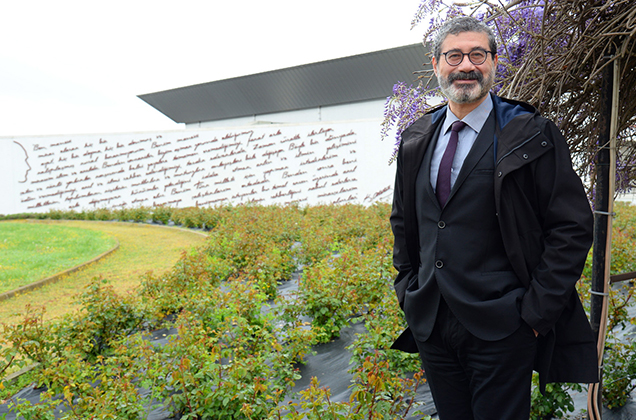
Yusuf Leblebici
What are your personal plans for the future?
Currently I just have one goal, and that is taking this university to the place where we have envisioned it to be. If I manage that, I will consider myself to have reached my goals.
Are you where you wanted to be in life? Did you have challenges or disappointments? How did you cope with them?
Not disappointments, but I did have challenges of course. Life is not easy; you do run up against difficulties and you cannot learn if you do not deal with them. I have always had challenges in my life. It teaches you a lot; coping with difficulties is an opportunity in development, so one should never complain about it. As I have always told my students: If you run into difficulties, do not complain--resolve it, and seek to gain something from it, which will benefit you in the future. And that is what they do. My personal experience has been similar: I never had a career path unroll before me on its own. There were times in my work and professional life where I found myself in difficult situations due to no fault of my own, and had to struggle to come clear. But the tenets are: 1) you do not complain; and 2) you do your best and seek to take lessons from what you do. It is a chance at growing and development. I tell this to my students all the time because difficulties will always exist.
"People can be happy in different ways; one can be successful in building an effective and satisfactory life by other means"
What would your advice to students be in terms of building a happy life and choosing a profession they like? For instance, is university education a must? What should they do other than their courses?
This is a broad topic but I'll answer your last question first. Going to university is not a "must" for anyone, and I say this as a man who has spent his entire life in university. A university degree is never a prerequisite to one's success or happiness in life. I have met plenty of people who had been very successful without a university education, and I have always admired them for this. You should not be stuck on this. But there is a fact: When guiding the youth, simply saying that they do not have to go to university is not enough; you should be able to provide them with alternatives. We need to back our words with paths that may lead them to a happy life without a university education. Is this something we are able to do in Turkey today? Unfortunately, no. Every year, some 2 million students take the university exam, and all are doing it in order to have a better chance at life. If, for example, we could offer them future prospects through vocational high schools, so many young people would not have to take these exams. Many other countries do this. To come back to your question: No, a university degree is not a prerequisite. People can be happy in different ways; one can be successful in building an effective and satisfactory life by other means.
What is happiness? A successful career, seeing the world? Living in luxury? Family and children?
Let me put it this way: To me, being able to do what you want to do is the most important thing. There is nothing more satisfactory than having the ability to do exactly what you want to do. I love traveling, I really do. But leave aside a luxurious life, forget mansions and yachts--if you can do the job you love, and it does not matter what it is, you can be a gardener, a sailor, a painter, and if you can excel at it, it will be your greatest source of happiness.
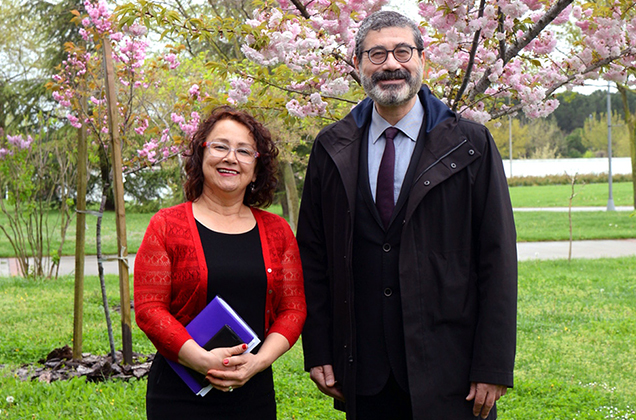
Thank you for joining me in Wednesday talks, Yusuf Bey. It was a pleasure talking with you.
Thank you very much.
Photos: Ender Erkek

